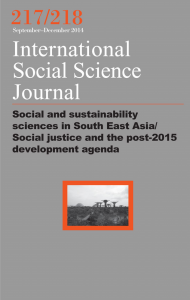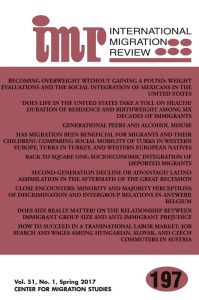Diversity & Inclusion Research: Unveiling and Promoting Diversity, Inclusion, and Access

This is the first editorial by Drs Gabriela C. Zapata and Taylor Le Cui, Co Editors-in-Chief of new multidisciplinary, Open Access journal, Diversity & Inclusion Research, published by Wiley. It is was originally published in the journal, here, on 6 November 2023 and reproduced here for wider dissemination:
The global crisis brought about by the COVID pandemic and the reinvigorated actions of social groups such as Black Lives Matter, #MeToo, and the Climate Movement once more brought to light the realities faced by countless minoritized communities, and the effects of systemic racism, discrimination, and climate change on people’s lives (Archibong & Annan, 2023; Fileborn & Loney-Howes, 2019; Joseph–Salisbury et al., 2020; Liu et al., 2022). These movements have reminded us that we all have a role to play in making this world more inclusive and equitable, and that the diversity of our societies must be celebrated and valued. The new journal Diversity & Inclusion Research seeks to contribute to the achievement of these goals.
The multidisciplinary, open access nature of the journal makes it unique. Unlike academic publications with more field-specific foci, Diversity & Inclusion Research offers researchers from diverse scholarly areas as well as social organizations and communities the opportunity to share high-quality local and international research centered on diversity, equity, inclusion, and accessibility at the individual, organizational, and societal level. The journal welcomes works resulting from projects that explore issues of opportunity, inequality, diversity, access, and inclusion as related to gender, ethnicity, class, language, citizenship, dis/ability, age, sexual orientation, religion, as well as other forms of inequality and protected characteristics. Investigations examining opportunities for furthering the UN Sustainable Development Goals, including but not limited to SDG 5 (gender equality), SDG 8 (decent work and economic growth), SDG 10 (reduced inequalities), and SDG 16 (Peace, Justice, and Strong Institutions) will also be showcased.
As a Gold Open Access journal, Diversity & Inclusion Research embraces Open Research practices, with the objective of not only improving the quality of diversity research and boost dissemination of its findings to raise public awareness, but also actively adopting policies and practices grounded in inclusion, equity, and equality. The journal’s foci and goals are embedded in the diverse publication formats that are accepted. For example, authors are invited to submit research articles and critical reviews of existing literature as well as practice/policy-based pieces, commentaries, and editorials. More importantly, Diversity & Inclusion Research hopes to become a platform where students, early-career and established scholars, activists, and advocates find a home for their diversity-related work.
The journal’s mission and focus on diversity, equity, and inclusion are closely connected to the personal and professional lives of the inaugural Co-Editors-in-Chief, Dr. Taylor Le Cui and Dr. Gabriela C. Zapata. Taylor positions himself as a cisgender gay man and as a Chinese migrant to New Zealand. Because of the struggles he faced after coming out publicly as a gay teacher in a Chinese university (Zhang, 2020), Taylor relocated to New Zealand and completed a second PhD to explore the workplace experiences of gay academics in China (Cui, 2022, 2023a, 2023b). By engaging with international media platforms, Taylor has increased the visibility of queer communities in China and Chinese queer international students in New Zealand (Chen, 2023; Lem, 2022; Wei, 2023). Currently, Taylor serves as an accreditation specialist at Rainbow Tick, an accreditation service dedicated to promoting inclusivity of Rainbow employees within New Zealand organizations. His current research projects focus on the workplace climate for Rainbow employees and development of Rainbow-inclusive policies in the workplace.
Gabriela is a cisgender, heterosexual woman of mixed Native Argentinean and Southern European ethnicity. She is a first-generation scholar who grew up in Argentina, in a household where education was always valued. She immigrated to the United States in 1994, and since receiving her doctoral degree in 2002, she has devoted most of her professional work to bridge the gap between research and practice with the objective of developing and implementing inclusive language education practices that connect to students’ diverse lifeworlds and answer their personal and academic needs (Zapata, 2022, 2023; Zapata & Ribota, 2021). As a linguist and a person who has suffered discrimination because of her accent in her second language, she has also strived to fight against linguistic prejudice, disinformation, and stereotypes (Zapata, 2020, in press). A pivotal moment in Gabriela’s personal life was the day when her son was diagnosed with autism spectrum disorder, which brought a new dimension to her understanding of and fight for diversity and inclusion and placed her at the forefront of the obstacles and exclusion faced by neurodiverse individuals. Her son’s journey has strengthened her lifelong goal to celebrate diversity and serve the communities she belongs to. Through her research and editorial work, Gabriela hopes to play an active role in giving voice to the lived experiences, challenges, and needs of diverse individuals in different global regions in search for social justice.
As Co-Editors-in-Chief, Taylor and Gabriela are privileged to have the opportunity to support global researchers and practitioners to share their knowledge and practice. They are mindful that diversity and inclusion is not just an area they work on, but a principle embedded in knowledge production. Based on this principle, they work with an editorial board with diverse expertise, identities, and backgrounds. Taylor and Gabriela do not wish to draw a strict boundary of scope, but, instead, they seek to keep the journal’s research open, diverse, and vibrant. They strongly encourage research from the Global South, support researchers and practitioners from minoritized backgrounds, and aim to bridge the gap between academia and industry. Above all, Taylor and Gabriela hope that Diversity & Inclusion Research will not only be a platform for leading and shaping research, but also for building community and facilitating opportunities for change.
Diversity & Inclusion Research is welcoming submissions for two special issues:
Linguistic Diversity and Social Justice: Preservation, Revitalization, Well-being, and Access
The objective of this special issue is to celebrate the 25th anniversary of UNESCO’s proclamation of International Mother Language Day in November 1999. Areas of interest include but are not limited to the following:
- Inclusive linguistic practices in education
- Decolonizing practices in connection with linguistic research
- Language and health access
- Linguistic inclusion and access in the workplace
- Language/community preservation and revitalization
- Language and climate change
- Language and migration
- Language and political/civic participation
- Language and identities
- Languages and discriminatory technologies
More…
Submission deadline for full papers: 31 May 2024
Queer experiences, queer inclusion: Challenging institutional cis-heteronormativity
This special issue aims to center the margins and reveal queer experiences in diverse contexts. We particularly encourage research that explores intersectional experiences, such as the challenges faced by transnational queer migrants (e.g. queer international students, queer migrant workers, queer refugees). We also encourage research in the under-researched context of the Global South and hope to support Global South researchers in publishing their work. Topics of interest include but are not limited to the following:
- Queer experiences and inclusion in:
- the workplace
- education
- healthcare
- Queer experience, and inclusivity with regional focus, especially the ‘Global South’
- Queer agency and resistance in repressive politics
- Intersectional experiences of the queer community
- Queer migrants’ lived experiences
- Social policy on queer issues
More…
Submission deadline for full papers: 1 July 2024




